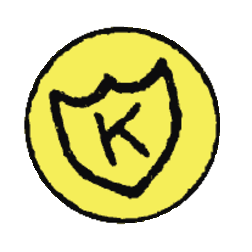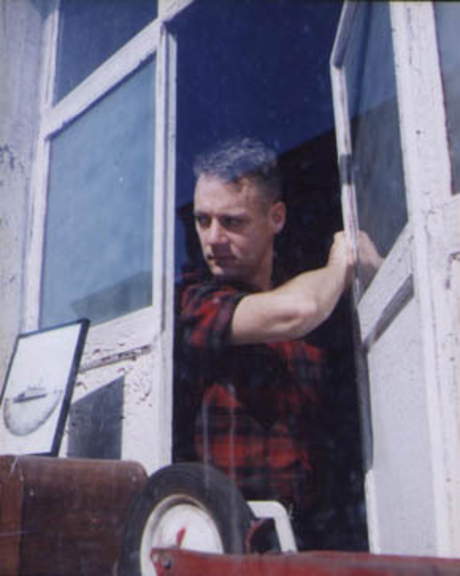The world of electronic pop will officially welcome its newest standout composer with the release of Electric Sunset’s eponymous debut album via K Records in September 2010. Electric Sunset is the new solo project of former Desolation Wilderness frontman Nic Zwart, and marks the return of his love for gadgetry. Zwart was ever the gentleman in answering questions regarding the famous Dub Narcotic Studio, the dissolution of Desolation Wilderness, why K Records’ secrets remain secrets and how rock music can be even colder than electronic music.

Nicolaas Zwart/Electric Sunset
Q: You started out as an intern for K Records and manned a lot of studio hours. That must have been a dream job. Which artists did you watch record and what ways were you involved?
Nic Zwart: I interned there in the beginning of ’07 and then they hired me in the middle of the year. It was pretty sweet. I worked on Jeremy Jay, Adrian Orange, Karl Blau and Old Time Relijun stuff, and a lot of other little things here and there.
 Q:
Q: You were working at the famous Dub Narcotic Studio. The equipment there is famous for
Dub Narcotic Sound System‘s reggae-influenced recording techniques. Did that actually limit you with what you wanted to do electronically?
A: Not at all. Most of the Electric Sunset recording was done in various houses I was living in over the Winter, but the ES bits at Dub Narcotic were just Mic -> Preamp -> Audio Interface -> Computer. So I got to use the really great old preamps but have the flexibility of my laptop also.
Q: When you started at K, you have said were more of an electronic artist until you had access to all this new equipment, which is partially how Desolation Wilderness came to be. Is that why this was so natural for you to form Electric Sunset? Did you miss what you started out as?
A: Yes, definitely. I really like using the computer as an extra compositional tool, as well as using synthesizers and samples to get sounds I couldn’t otherwise. I like bands too, but I wanted to return to a more “insular” way of writing and recording music, as well as use sounds beyond the scope of Desolation Wilderness in band mode.
Q: What is the story behind ending the Desolation Wilderness era?
A: It felt like a good time… We had been on a pretty long tour (basically three straight months in the U.S. and then Europe) which was very fun but also taxing, and I was moving to San Francisco. Also, I was tired of worrying about what other people thought of my music, so this new project was a way to step away from that and make music for myself. I’m happy when people like it, but on the other hand it doesn’t bum me out very much when they don’t.

Desolation Wilderness
Q: What are Adam [Oelsner] and Andrew [Dorsett] [former Desolation Wilderness members] up to musically these days? Any new projects for them?
A: Andrew is still in
LAKE. And Adam I think left that band and then was in France for a few months. I haven’t been staying in touch with people back in Olympia as much as I could, I think, so it’s been a while since I spoke to them.
Q: How did the electronic element evolve into such a large influence for you?

Go Geoducks!
A: I’ve loved electronic music ever since high school, and then in college I was part of the really excellent electronic music program at the Evergreen State College in Olympia, so I got to play with some amazing synthesizers, samplers and stuff. I think I just never stopped loving that way of making music since I first got into it.
Q: Electric Sunset songs like “Soda” and “Last Night on Earth” are so well-crafted and beautiful. Which artists inspire you from a production standpoint?
A: Thanks! I think production-wise, I really appreciate a lot of what
Tony Visconti,
Nigel Godrich,
Clement Dodd, and even the dudes in
Basement Jaxx have done. And whoever produced “Fantasy” by
Mariah Carey is pretty rad too [the producer was
Dave “Jam” Hall, who also worked with
Madonna,
Mary J. Blige,
Usher and was married to
Wanda Sykes].
Q: “Soda” is an amazing song, the kind of song Pitchfork should/will jump on and make you a Pitchfork star. Do you ever think about that kind of stuff? How do artists think of Pitchfork?
A: I try to think about Pitchfork as little as possible. I think every artist is different with how they regard big publications/blogs like that, but with Electric Sunset, I’m making a conscious decision to stop worrying about getting attention from that sort of stuff. Which is not to say the upcoming LP won’t be publicized, it of course will be, but I just want to play my music and have a good time doing it, instead of trying to get as many people to hear it as possible by getting Pitchfork or whatever to write about it.

Zwart
Q: Back to “Soda.” It’s perfect. Why is it called “Soda”? Why is it so fucking good?
A: I think it’s probably the rolling claves! It’s called “Soda” because the word soda is used in the song as slang for beer.
Q: Are you now just working by yourself in a studio or do you have collaborators?
A: Right now I’m solo. At some point it would be fun to collaborate with someone, but I’m going to play for a bit on my own and see how it turns out.
Q: Do you ever find a coldness in electronic music or is it something you don’t think about?
A: Sometimes I do. Also, I find some rock music really cold, especially modern alt-rock hits and that sort of stuff. I think a lot of electronic music can be extremely warm feeling also. It’s a very flexible medium in terms of emotional expression, and I also think that the line between what is and is not electronic music is completely blurred. I think you could say that something is electronic if it’s recorded onto a computer and then looped to create a perfect performance, which would make basically every single in the Top 100 electronic music.
Q: Describe the recording/production process for an Electric Sunset song.
A: Right now, for brand new stuff I’ve been demoing after finishing the LP, I’ll start with a beat and/or a bassline and work up from there, creating tons of little parts around that. For the LP, I wrote all the songs on guitar and then put beats on them and in many cases replaced the guitar with other sounds.
Q: Your voice is a lot more prominent than it was in Desolation Wilderness songs. It’s a damn good voice. Why were you hiding it before?
A: It’s because I was brand new at singing in DW. And, frankly, I was bad at it then, so I hid it. Not that I think bad voices aren’t good! You know? But I thought mine was bad, and I had control of the faders, so that’s the way I mixed it. These days I’m a bit more confident with it.
Q: Where did the songs on your
muxtape/
myspace come from? I don’t see any EPs released yet, so are those just examples of what’s to come or will those appear on the September release?
A: Every song streaming on the internet right now is going to be on the September LP, which is self-titled.
Q: Talk a little bit about working with Jeremy Jay on “Airwalker.” Did you work with any other K musicians?
A: I’ve worked with a ton of K people, it’s fairly close knit. “Airwalker” was recorded I think the week of 4th of July 2007, so I remember fireworks and barbecues mostly.
Q: Do you have any sort of working relationship with Calvin Johnson?
A: Yeah, he was first my intern sponsor and then essentially my boss at the studio. It was incredibly great to work with him because he was down to show me the ropes, was very friendly and fun to be around, and also was very open to my opinion about recording stuff.

K Records, "Booty Run" founder Calvin Johnson
A: I cannot! There are a lot of mysterious things that people (including me) ask him about, but I think he likes to keep them mysterious.
Q: Your own K rec bio page mentions your journey from San Fran to Seattle and back to San Fran. Do you think your music has partly mirrored your travels, or has your environments influenced your sound at all?
A: Hmm, I think it probably has, but I couldn’t actually say exactly how. Consciously, I don’t try and mirror where I’m living in my music. I find that who I’m around, rather than the place I’m living, has a much larger effect on the way I feel, so I think maybe I write about that mostly.
Q: What details can you give us about the album due out in September?
A: It has nine songs, it’s half an hour long, it’s self-titled. I played everything on it and the cover is a picture of me. I guess you could say it’s a personal album and a labor of love.
Q: When are you going to back on tour? Any details about who you might be touring with?
A: I have plans for a full US tour sometime in the Fall, at this point there are no details whatsoever, just intentions. Before that, I think I’m going to do a short Pacific Northwest tour in late August, around the Helsing Junction festival in Washington state.

Two cool cats (compliments of K records)
Tags: Adrian Orange, Airwalker, Basement Jaxx, Beat Happening, beer, Calvin Johnson, Calvin Johnson & the Sons of Soil, Clement Dodd, Dave "Jam" Hall, Dave Hall, Desolation Wilderness, Dub Narcotic Sound System, Dub Narcotic Studio, Electric Sunset, electronic music, Jeremy Jay, K Records, Karl Blau, LAKE, Madonna, Mariah Carey, Mary J. Blige, Music, Nic Zwart, Nicolaas Zwart, Nigel Goodrich, Old Time Relijun, pitchfork, rock, soda, Tony Visconti, Usher, Wanda Sykes


![636[1]](https://halfdeafmusic.files.wordpress.com/2010/06/6361.jpg?w=490&h=312)









